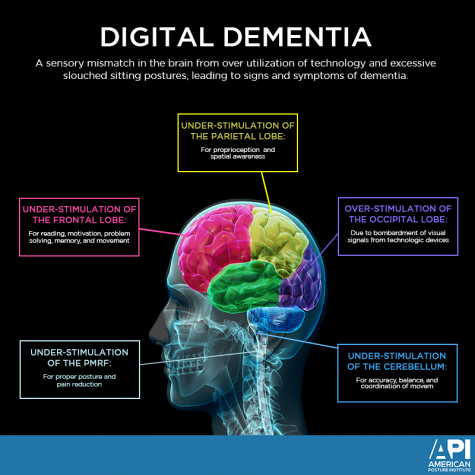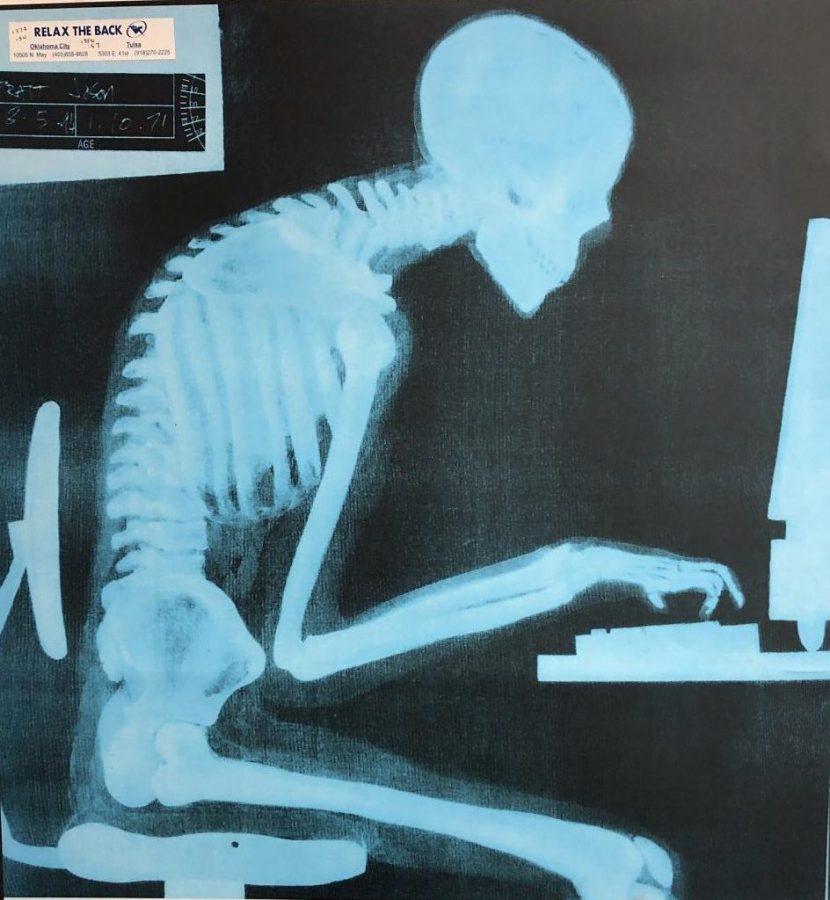Harmful Effects of Technology
With electronic devices and services at an all time high, it’s no surprise that there have been links to excessive technology use and health issues; and teens are at the center of it all. In 2018, according to Pew Research Center, 95% of teens had access to phones and 45% of those teens said they were on their phones almost constantly. Teens who are continuously on their phones, computers, and gaming consoles run the risk of suffering difficulties after technology creates issues with their psychological, social, and/or physical health.
Psychologically, technology can make people impatient, subject to frequent distractions, and desperate for constant entertainment. Professor Larry Rosen of California State University says that many people could be diagnosed with iDisorder. iDisorder is characterized as “exhibit[ing] signs and symptoms of a psychiatric disorder,” which are present by one’s use or overuse of technology. Signs of iDisorder may be a need to check messages, a strong desire to update your social media status, or near addiction to online games. A study of Chinese youth with Internet Addiction Disorder (IAD) showed that kids addicted to technology at a young age tended to have a reduced amount of gray matter and white matter in areas of the brain associated with cognitive control and goal-directed behavior.
Socially, technology can bring depression, lower self-esteem, difficulty socializing, and a desire for human isolation. Depression can be caused by around the clock exposure to artificial light; this throws off your circadian rhythm and can lead to the negative effects like mood disorders and an increased risk for cancer. A research conducted by Stanford University found that girls ages 8-12 who spent extensive time on media attempting to multitask, reported lower self-esteem and a harder time socializing compared to less-media driven peers.

Besides psychological and social effects, technology can bring along major health conditions. Issues like vision problems, hearing loss, neck strain, and sitting too much are common among everyone who stares into a computer monitor all day. Eye problems associated with excessive technology use include eye strain, blurred vision, and dry eyes. Earbuds can cause tinnitus (ringing in the ears). Once those sensitive hair cells in the inner ear become damaged they can never grow back. Neck strain is created when people bend their heads down whether on the phone or computer. The head is no longer supported by the whole system of vertebrae, only one’s neck. This unnatural position can cause pain and spinal issues, such as scoliosis. When people spend most of their day seated at computers or gaming systems, they run the risks for obesity, diabetes, heart attack, high blood pressure, high cholesterol, and cancer.

Young woman spending too much time on her computer. This can lead to psychological, social, and health concerns.
So how much screen time is too much? CBS News recommends kids and teens between the ages of 8 to 18 spend no more than 2 hours a day on their devices. This is much lower than the actual amount of time kids and teens spend on their devices, which is 7 hours a day. Spending more time outside and more face-to-face interaction with peers is beneficial in helping to limiting screen time, as well as setting media-free zones at certain times.
Be aware of these risks when using technology excessively. But also remember that technology can be a great advantage if used in healthy amounts. It can lead to diverse discussion networks, access to the world web, can enhance communication, and provide entertainment. So, be responsible and treat your body well. Check out these articles on the harmful effects of technology by Digital Responsibility, the surprising lab reports from Pew Research Center, and the screen time reports from CBS News.
http://www.digitalresponsibility.org/health-and-technology
https://www.pewresearch.org/internet/2018/05/31/teens-social-media-technology-2018/





